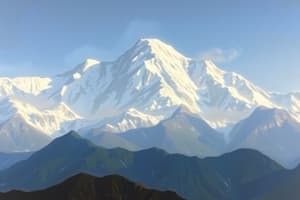Podcast
Questions and Answers
Which mountain range is known for its unique biodiversity and water resources?
Which mountain range is known for its unique biodiversity and water resources?
- Thar Desert
- Himalayas
- Indo-Gangetic Plain
- Western Ghats (correct)
Where are the Eastern Ghats located along India's coast?
Where are the Eastern Ghats located along India's coast?
- Northeast (correct)
- Northwest
- Southeast
- Southwest
Which desert is characterized by sparse vegetation, sand dunes, and scarce rainfall?
Which desert is characterized by sparse vegetation, sand dunes, and scarce rainfall?
- Gobi Desert
- Sahara Desert
- Atacama Desert
- Thar Desert (correct)
Which mountain range forms a continuous range unlike the Eastern Ghats?
Which mountain range forms a continuous range unlike the Eastern Ghats?
Which region of India is known for its unique ecological niche supporting a diverse population of plants and animals?
Which region of India is known for its unique ecological niche supporting a diverse population of plants and animals?
Which mountain range is considered the highest in the world?
Which mountain range is considered the highest in the world?
Where do the Western Ghats run along?
Where do the Western Ghats run along?
Which region is characterized by alluvial soil and relatively flat terrain?
Which region is characterized by alluvial soil and relatively flat terrain?
Which of the following is NOT a peak in the Himalayas?
Which of the following is NOT a peak in the Himalayas?
Which mountains help separate the Deccan Plateau from a coastal plain?
Which mountains help separate the Deccan Plateau from a coastal plain?
Which region is famous for its endemic species and significant role in India's ecology and weather?
Which region is famous for its endemic species and significant role in India's ecology and weather?
Study Notes
Physiography of India
Himalayas
The Himalayan mountain range runs along the northern border of India and is considered the highest mountain range in the world. It extends from Ladakh in the north to the state of Arunachal Pradesh in the east. Some of the highest peaks in India, including Kanchenjunga (8,598 m) and Nanda Devi (7,816 m), can be found in the Himalayas. The range serves as a barrier against cold polar winds, keeping northern India warmer during winters and contributing to the monsoon winds that help regulate the climate.
Indo-Gangetic Plain
The Indo-Gangetic Plain, also known as the Gangetic Plains or the Northern Plains, is a flat and fertile region that stretches from the Indus River in Pakistan to the Punjab Plain. It is the most important social and economic region of India due to its agricultural productivity. The plain is characterized by alluvial soil deposited by rivers and is relatively flat, with only minor variations in elevation.
Western Ghats
The Western Ghats, also known as the Sahyadri mountains, run along the western edge of the Deccan Plateau and separate it from a narrow coastal plain along the Arabian Sea. They are part of the larger Western Ghats-Eastern Ghats biodiversity hotspot. The Western Ghats are home to numerous endemic species and play a significant role in shaping India's ecology and weather patterns.
Eastern Ghats
The Eastern Ghats are a series of mountain ranges along India's eastern coast, extending from Odisha in the north to Tamil Nadu in the south. Unlike the Western Ghats, the Eastern Ghats are not as high and do not form a continuous range. Instead, they are a series of smaller ranges that pass through various states before converging with the Western Ghats at the southern tip of India. The Eastern Ghats are important for their unique biodiversity and the water resources they provide.
Thar Desert
The Thar Desert, also known as the Great Indian Desert, is located in the northwestern part of the Indian subcontinent, covering parts of Rajasthan, Gujarat, and Haryana. It is the world's eighteenth largest desert and is characterized by sparse vegetation, sand dunes, and scarce rainfall. Despite its harsh environmental conditions, the Thar Desert supports a diverse population of plants and animals adapted to its unique ecological niche.
Studying That Suits You
Use AI to generate personalized quizzes and flashcards to suit your learning preferences.
Description
Explore the key geographical features of India, including the Himalayas, Indo-Gangetic Plain, Western Ghats, Eastern Ghats, and Thar Desert. Learn about the unique characteristics and significance of each region in shaping India's landscape, ecology, and climate.




